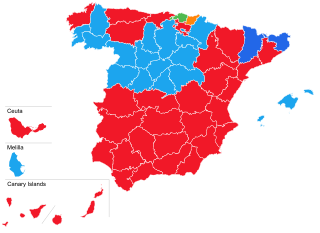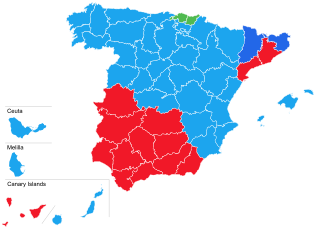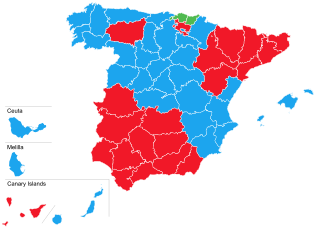
Ceuta is an autonomous city of Spain on the North African coast.

Hinduism is a minority faith in Gibraltar followed by 2% of the population. Most of the Hindus in Gibraltar are of Sindhi origin.
Indians in Spain form one of the smaller populations of the Indian diaspora. According to the statistics of India's Ministry of External Affairs, they number only 35,000, or 0.07% of the population of Spain. 2009 statistics of Spain's Instituto Nacional de Estadística showed 35,686 Indian citizens in Spain; this figure does not include persons of Indian origin holding other citizenships. Most Indians originally migrated to Spain from Africa, while others came from India and even Japan and Southeast Asia. The overwhelming majority of Indians in Spain live in the Barcelona area. According to data from 2021, Indians in Spain number more than 57,000.

The Odinist Community of Spain – Ásatrú, also known as European Odinist Circle, is a neo-völkisch organisation in Spain, founded in 1981, for followers of the form of modern Heathenry known as Odinism. The community bases its ideology on the Visigothic, Suevian and Vandalian Germanic heritage of modern Spain, Portugal and Occitania. It was legally recognised as a religious institution by the Spanish government in 2007, and performed the first legal pagan wedding in mainland Spain since the Visigothic era, in Barcelona on 23 December 2007. In Albacete in 2009, COE completed the first temple to Odin believed to have been built in over 1,000 years. A less Odin-focused group split off in 2012 as the Ásatrú Lore Vanatrú Assembly (ALVA).

Religion in Catalonia is diversified. Since the Expulsion of the Jews and the Moriscos in the late 15th and early 17th centuries respectively, virtually all the population was Christian, specifically Catholic, but since the 1980s there has been a trend of rapid decline of Christianity, also driven since the 1980s by the religious authorities' association with Francoist Spain. Nevertheless, according to the most recent study sponsored by the government of Catalonia, as of 2016, 61.9% of the Catalans identify as Christians, up from 56.5% in 2014, of whom 58.0% Catholics, 3.0% Protestants and Evangelicals, 0.9% Orthodox Christians and 0.6% Jehovah's Witnesses. At the same time, 16.0% of the population identify as atheists, 11.9% as agnostics, 4.8% as Muslims, 1.3% as Buddhists, and a further 2.4% as being of other religions.

Spain and Pakistan have diplomatic and bilateral relations.

This is the results breakdown of the Congress of Deputies election held in Spain on 28 October 1982. The following tables show detailed results in each of the country's 17 autonomous communities and in the autonomous cities of Ceuta and Melilla, as well as a summary of constituency and regional results.

This is the results breakdown of the Congress of Deputies election held in Spain on 9 March 2008. The following tables show detailed results in each of the country's 17 autonomous communities and in the autonomous cities of Ceuta and Melilla, as well as a summary of constituency and regional results.

This is the results breakdown of the European Parliament election held in Spain on 25 May 2014. The following tables show detailed results in each of the country's 17 autonomous communities and in the autonomous cities of Ceuta and Melilla.

This is the results breakdown of the Congress of Deputies election held in Spain on 22 June 1986. The following tables show detailed results in each of the country's 17 autonomous communities and in the autonomous cities of Ceuta and Melilla, as well as a summary of constituency and regional results.

This is the results breakdown of the Congress of Deputies election held in Spain on 29 October 1989. The following tables show detailed results in each of the country's 17 autonomous communities and in the autonomous cities of Ceuta and Melilla, as well as a summary of constituency and regional results.

This is the results breakdown of the Congress of Deputies election held in Spain on 6 June 1993. The following tables show detailed results in each of the country's 17 autonomous communities and in the autonomous cities of Ceuta and Melilla, as well as a summary of constituency and regional results.

This is the results breakdown of the Congress of Deputies election held in Spain on 3 March 1996. The following tables show detailed results in each of the country's 17 autonomous communities and in the autonomous cities of Ceuta and Melilla, as well as a summary of constituency and regional results.

This is the results breakdown of the Congress of Deputies election held in Spain on 12 March 2000. The following tables show detailed results in each of the country's 17 autonomous communities and in the autonomous cities of Ceuta and Melilla, as well as a summary of constituency and regional results.

This is the results breakdown of the Congress of Deputies election held in Spain on 14 March 2004. The following tables show detailed results in each of the country's 17 autonomous communities and in the autonomous cities of Ceuta and Melilla, as well as a summary of constituency and regional results.

This is the results breakdown of the European Parliament election held in Spain on 15 June 1989. The following tables show detailed results in each of the country's 17 autonomous communities and in the autonomous cities of Ceuta and Melilla.

This is the results breakdown of the Congress of Deputies election held in Spain on 15 June 1977. The following tables show detailed results in each of the country's 17 autonomous communities and in the autonomous cities of Ceuta and Melilla, as well as a summary of constituency and regional results.

This is the results breakdown of the Congress of Deputies election held in Spain on 1 March 1979. The following tables show detailed results in each of the country's 17 autonomous communities and in the autonomous cities of Ceuta and Melilla, as well as a summary of constituency and regional results.
As in the rest of Spain, the majority religion in the Canary Islands is the Catholic Church. The Catholic religion has been the majority since the Conquest of the Canary Islands in the fifteenth century. This religion would largely replace the Canarian aboriginal religion through the prohibition of the latter and syncretism. According to a survey conducted in 2019, Canary Islands is the fifth autonomous community in Spain with the highest percentage of people who declare themselves to be Catholics after the Region of Murcia, Extremadura, Galicia, Aragon, and Castile and León. 76.7% of the population is Catholic.
Kissy Chandiramani Ramesh is a Spanish politician from Ceuta. A member of the Ceuta's autonomous government, she briefly served as MP in the Congress of Deputies in 2019 as part of the People's Party (PP) parliamentary group.





















